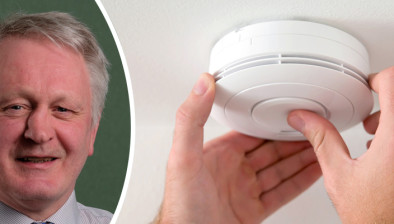SELECT issues reminder for launch of new legislation on heat, smoke and carbon monoxide alarms
With just two months to go until new fire safety legislation comes into effect, influential trade association SELECT is reminding homeowners to ensure they have compliant heat, smoke and carbon monoxide (CO) alarms installed.

Bob Cairney, director of technical services at SELECT
The campaigning body for the electrical industry in Scotland says it’s vital that preparations are made now before new Scottish Government guidance for all Scottish homes comes into effect on February 1 2022.
Scotland’s largest trade association is also reminding the public to:
- Employ a qualified electrician to install any hard-wired systems
- Ensure the correct certification is issued on completion of any work
- Check that any self-installed battery alarms comply with relevant standards
- Report any rogue door-to-door traders offering to install cut-price alarms
- Contact their home insurance provider to discuss any potential impact.
Bob Cairney, director of technical services at SELECT, said: “Our members are seeing a rise in requests for installation, but it is becoming clear that there is also still a great deal of uncertainty about what is required to be compliant.
“As part of our ongoing information campaign, we strongly recommend a hard-wired interlinked alarm system, installed by a qualified electrical professional.
“Self-installed battery systems are of course also permissible, but if choosing this option, homeowners should always ensure that they only use compliant products. They should also seek help if they are unsure how to install these alarms themselves, with SELECT able to put them in touch with their nearest professional.
“We’re also reminding the public that they should be given relevant certification for the installation of a fire alarm system as recommended in the industry Code of Practice BS 5839-6:2019 as amended, i.e. a certificate of design, installation and commissioning to show that an installation complies with the standard.”
Mr Cairney said the use of qualified professionals was a vital part of ensuring safety and would prevent householders being duped by rogue traders trying to take advantage of the looming deadline.
He added: “Unfortunately, there are plenty of unskilled and unscrupulous people out there looking to cash in on the introduction of this new legislation.
“Our advice would be to always use the services of an accredited installer such as a SELECT Member who should be able to advise on design, installation and commissioning. Your local member can be found at www.select.org.uk and any issues with non-compliant products reported to Advice Direct Scotland on 0808 164 6000.”
After recent uncertainty, the association is also advising homeowners to contact their insurer to check if the new legislation might affect their home insurance.
Mr Cairney added: “We are regularly being asked how the new legislation will impact home insurance and we are currently advising that it will depend on the terms and conditions of individual home insurance policies. Homeowners should always contact their insurer to check if the new rules are included in their policy.”
SELECT’s latest reminder came after it launched an awareness campaign in September which included an engaging and informative animation and a dedicated page on its new website.
In October, it also joined the Society of Chief Officers of Trading Standards in Scotland (SCOTSS) to warn that all heat, smoke and CO alarms being fitted under the new legislation must comply with the relevant product standards.
The new standard requires that all homes in Scotland must have a smoke alarm on every storey including hallways and landings, a smoke alarm in the most frequented part of the house, such as the lounge, a heat alarm in the kitchen and a CO alarm wherever there is a fuel burning appliance.
In addition, all the heat and smoke alarms must be interlinked – either mains-powered with battery back-up – or be battery-powered by a tamper-proof long-life battery to ensure there is an effective warning system.









